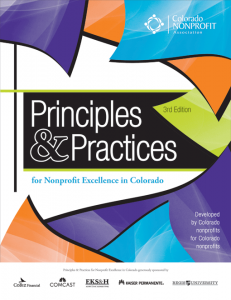This is the fifth post in a series about Colorado nonprofit corporate governance issues. Click here for the most recent post on Robert’s Rules of Order, here for differences between articles and bylaws, here for an earlier post on membership issues, and here for the initial post on proxy voting.
Nonprofits often wonder which, if any, policies they should have in place. While there certainly is no one-size-fits-all guide, it is generally a good idea for nonprofits to consider implementing some form of the following policies:
- Conflict of Interest: this policy outlines how a nonprofit would deal with transactions presenting a conflict between the organization and an insider like an officer or director. This would cover, for example, the rental of office space by a director to the organization. The policy generally will explain who is covered by the policy; require disclosure of conflicts; address how the board should consider and potentially approve a conflict transaction; and how the transaction should be documented.
- Document Retention: this policy outlines how long an organization will keep certain documents, and how document destruction should be handled (e.g., security concerns, when destruction needs to be halted, etc.).
- Whistleblower: this policy covers how an organization will respond to claims of wrongdoing, how such claims should be reported, and related issues like confidentiality and lack of retaliation.
- Gift Acceptance: this policy governs which types of gifts an organization will and will not accept, any due diligence that must be done on gifts, who must approve certain gifts (e.g., the Board or finance committee), and how certain gifts should be documented.
The IRS asks organizations applying for tax-exempt 501(c)(3) status if they have a conflict of interest policy, and if not, how they plan to address such conflicts. In addition, the Form 990 annual information filing requires organizations to disclose whether they have conflict of interest, document retention and whistleblower policies. So while these policies aren’t technically required, they are strongly recommended. Otherwise, organizations may be in the position of explaining to interested stakeholders why they do not have them.
Keep in mind that the policies won’t necessarily look the same for all organizations. A smaller organization expecting to receive mainly cash donations, for example, does not need a 20-page gift acceptance policy that addresses charitable remainder trusts and gifts of real estate. And a document retention policy for a hospital will be much more elaborate than one for a small family foundation. But putting policies in place up front can help boards and staff avoid confusion and some potentially sticky situations.


